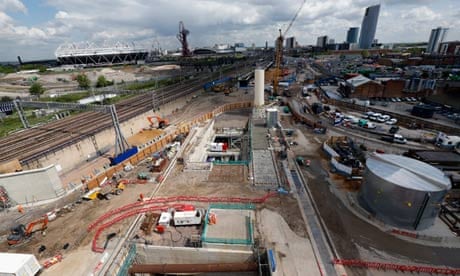A £3bn investment in infrastructure promised by George Osborne to stimulate Britain's flat-lining economy "could be entirely consumed" by problems with his overhauled Private Finance Initiative, according to economists.
Public funds will be required simply to make up a shortfall in the hoped-for private finance for three large investment projects, each worth £1bn-£2bn, said Mark Hellowell, of Edinburgh University. "It looks as if much of the extra public capital expenditure that the chancellor talks about is in fact substituting for the disappearance of planned private capital."
In opposition, Osborne slammed the PFI as an accounting wheeze beset with "perverse incentives", but late last year he reinvented it as "PF2", a rebrand and refinement which seeks to entice new investors into the market by limiting their financial exposure and keeping more risks with the public sector. Before the recent increase to public capital spending was announced, Whitehall had been looking to PF2 to finance a raft of major infrastructure projects. Subsequently, however, several of these have come unstuck.
After Michael Gove's move to ditch Labour's school rebuilding plans in 2010 ran into the wrath of parents and teachers, the coalition made a partial U-turn and announced that it would upgrade the institutions in most urgent need, through a PFI-style "priority school programme" worth around £2bn. This month the Department for Education let slip that private finance of that programme had been scaled back by £1bn. The department was forced to make an immediate allocation of £300m of its own money to cover 27 schools, and hopes that June's spending round will agree sufficient public funds to cover the rest.
In March, the government conceded that an intended £1bn public-private partnership to finance the rolling stock for the Crossrail project running through central London would now be entirely footed through Whitehall's own capital budgets.
In the same month, the Ministry of Defence backed away from the planned use of private finance for its Future Force 2020 scheme for soldiers' accommodation, with the defence secretary, Philip Hammond, allocating £1bn from his own budget to fund the proposals instead.
With no central list of all the schemes going ahead or being cancelled, the total cost to the public finances of plugging gaps in private finance cannot be known for certain. But Hellowell said that "in the worst case the extra capital spending the chancellor talks about could be entirely consumed in addressing the gaps left by a failing PF2".
Jonathan Portes, of the National Institute for Economic and Social Research, warned that problems with PF2 could undo action the government is taking to boost growth: "To the extent that its claimed additions to public investment simply substitutes for investment that was planned to be financed 'off balance sheet' via PFI, it will have no significant macroeconomic impact at all".
A Treasury spokesperson defended PF2, insisting that the model "will provide more flexibility, transparency and better value for money". The spokersperson said "five batches of schools projects at a value of around £700m" were going ahead. The government was "committed to using private finance where it delivers the best outcome for the project", but recognised "that there is 'no one size fits all' solution to the delivery of complex infrastructure projects".
Chris Leslie, Labour's shadow financial secretary to the Treasury, said: "George Osborne has already invested billions less in infrastructure than the plans he inherited, meaning house-building is at record lows and the construction sector is in decline. Now it looks like the relatively small amount of extra funding in the budget will simply offset the shortfall in private finance."

Comments (…)
Sign in or create your Guardian account to join the discussion